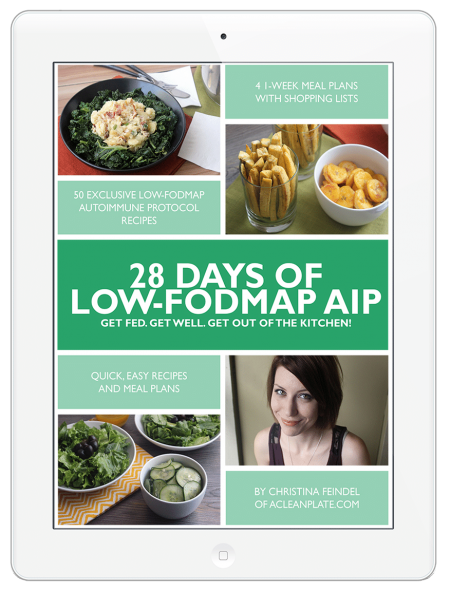Staying Motivated on the Autoimmune Protocol

“Stick with something long enough, and it’ll become a habit. It’ll be second nature.” You’ve heard that before, right? It’s what all the fitness gurus say about starting an exercise regimen. “It’ll only feel like a chore for so long.”
Well, the truth is that it takes a long time for a habit to form–more than two months of dedicated, consistent effort–and if it’s something you don’t want to do in the first place and feel a lot of mental resistance toward, it may never become second nature. How many times have you tried working out, flossing everyday, or changing your diet and done pretty well until you caught a cold or got swamped at work, then failed to get back into it after you recovered?
When we talk about staying motivated on the autoimmune protocol or with any other lifestyle change, what we’re talking about is an emotion. A feeling that you’re eager or excited to do something. The things that make me feel “motivated” might not work for you and even if they do, your motivation may not be as potent or long-lasting. It’s a nebulous and fleeting concept we’re conditioned to take advantage of when it arrives and chase after the rest of the time. We’ve been led to believe that the more energized we are about something, the more likely we are to stick with it. But it’s extremely difficult to control your emotions. When we don’t feel motivated, we start to think “eh, maybe I don’t care as much as I thought I did” or “it’ll be okay to take a few days off until I start feeling motivated again”.
It’s so much easier to control our actions than our mindsets. And once you actually get up and start cooking, exercising, or whatever else it is you don’t feel like doing but know you should, you might find that your mindset starts to shift. Oh, this isn’t so bad. I can do this. And when you finish that meal, workout, or whatever? You’ll probably feel a lot better about your day.
Sometimes you just don’t feel like doing things even if they’re important to you. That doesn’t mean you don’t care about them anymore. It’s perfectly natural for motivation to be high at the start of an undertaking, then taper as time goes on and challenges and distractions start piling up. But if you want to reach your goals, you’ve gotta step up and chase them whether you feel motivated or not. Conditions don’t have to be perfect for practice to be fruitful. A 5% effort, or 1% progress, is still better than 0%.
The AIP works the same way. There will be days it’s harder than others. There will probably be days it doesn’t happen. The important thing is to not let those days, those “setbacks”, become permanent. Sharing a hot cocoa with your kid or raiding the office candy jar is fine. It’s human. It’s okay. Your body can handle it. Just don’t let it be an excuse to write the whole day, week, or endeavor off.
Here are some of the things I try to keep in mind when I’m struggling with a new habit.
Choose Goals You Care About
If you know you should exercise but you don’t actually want to do it, you’re probably not going to stick with it. But maybe you’ve always wanted to learn how to salsa dance or maybe you wish your stiff joints were more flexible. So make this the month you start taking dance lessons or doing 10 minutes of yoga during your lunch breaks. If you engage in your favorite physical activities regularly, you’ll be getting exercise without actually feeling like you’re exercising. Maybe you don’t care as much about “eating healthier” as you do about “trying new recipes”. Sometimes, you can re-frame your health goals in ways that sound like fun or at least don’t sound as challenging. Cooking or exercise can be valuable “me time” where you listen to your favorite music, shows, or audiobooks, or if you have someone doing it with you, valuable social time with your family or friends.
Choose Goals You Can Achieve
Don’t set out to have the body of a movie star or the skills of an all-star chef if you’ve never lifted a weight or set foot in the kitchen before. Remember, chefs have a lifetime of experience and movie stars get paid a lot of money to look the way they do. Shoot for something more manageable, like “at least 15 minutes of yoga every other day” or “three home-cooked meals a week”. You’ll feel more accomplished when you meet those goals and amazing when you overshoot them. Remember, progress takes time and it’s important to have realistic expectations. For example, someone whose thyroid has been destroyed by Hashimoto’s disease will likely require medication for life. Hoping you’ll be able to stop taking thyroid drugs may not be realistic, and the disappointment you feel when it doesn’t happen could be extremely discouraging. So make sure your hopes hinge on things that are within your control. It’s easier to achieve behavior goals like “go for a walk” than it is to achieve something like “completely eliminate my arthritis pain”.
Take it Slow
If the thought of starting the whole AIP tomorrow is too overwhelming, try just removing coffee or soda first before moving on to something else you suspect may not be working well for you. Starting small can help create a foundation for you to build off of. Embrace incremental progress and don’t push yourself further than you need to or can handle. For example, a lot of people do the AIP plus GAPS plus anti-candida plus the low-FODMAP diet believing that if one of these diets is good, all four will be extremely healing. But we have to be careful. Excessive restriction is an eating disorder and its easy to become afraid of food if you think of any or most food as “bad”. Food in and of itself is a neutral entity. It’s fuel and most people can eat most foods just fine. How we relate to it is where we get into trouble. While some people may benefit from something beyond the scope of the AIP, it should only be done at a healthcare provider’s recommendation. If you don’t have SIBO or IBS, adding a low-FODMAP restriction on top of the AIP may be needlessly depriving yourself of nutrients while adding unnecessary stress. And if you do have SIBO or IBS, you may want to just try a low-FODMAP diet before starting the AIP to see if the AIP is even necessary to help identify any additional food sensitivities.
Keep a Journal
If you check in with your goals on a daily or weekly basis, you’re much more likely to hold yourself accountable to them. Using something like The Ultimate Health Journal, write down the steps you’re taking to reach that goal and any reasons you might have struggled so far. Things like “Sharon brought donuts into the office and I couldn’t resist.” If that obstacle keeps cropping up, you’ll know it’s something you need to address. Maybe there’s someplace else she can put the donuts so you don’t have to see or smell them. Maybe you can bring a healthier treat of your own into the office so you don’t feel left out. And when you do something proactive toward meeting your goals, you’ve got tangible proof that you’re making progress.
Avoid Unnecessary Temptation
If you really need to give up caffeine for your anxiety but are really, really struggling doing so, maybe you can avoid having any in the house or driving past your favorite coffee shop. (Speaking from experience on this one!) We are not always good at resisting temptation and nobody manages to do it 100% of the time. Set yourself up for success by making success as easy as possible… by eliminating temptations when and where you can.
Practice Gratitude
“I miss breakfast cereal” or “I could have done so many other things with that hour at the gym” are natural thoughts to have, but they aren’t helpful ones. Let them pass as soon as they form, then turn your thoughts to the positives and spend some time exploring them. “My new breakfasts give me so much energy and they’re tasty in their own way” and “I feel great after a good workout and I’m so proud of myself for every minute I invest in my own well-being”. The more energy you spend on positive affirmations and gratitude for your wins, the more resilient you’ll be to the stress and effort involved in attaining them.
Ask for Help
Having a helping hand in the kitchen or a partner at the gym can be a huge relief, easily turning a chore into a social event. It’s also important to have a healthcare provider–whether it’s a doctor, nutritionist, or personal trainer–that respects your efforts and can help you troubleshoot any plateaus or setbacks you run into. Even if it’s just someone to watch the kids on occasion, put away the laundry, or mow the lawn for you, a bit of assistance can go a long way toward easing your burdens, making the stuff you can’t get help with a little bit easier for you to attend to. Remember that without your health, it will be much more difficult to take care of your family, friends, and career. It’s not selfish to put your needs first every now and then! Some days are harder than others, so by all means reduce stress and obstacles where you can and give yourself some grace.
The short version: The more a lifestyle change becomes something you train your mind to look forward to, the less motivated you’ll need to feel to stick with it. And while we all have different ideas of what constitutes “fun”, turning it into a social situation, valuable “me time”, or having a supportive community can make a world of difference.
Looking for Low-FODMAP recipes?
28 Days of Low-FODMAP AIP combines IBS and autoimmune diets in a 28-day meal plan designed to jump start and simplify this often-challenging duo. But wait: This meal plan includes 50 exclusive low-FODMAP recipes you won’t find anywhere else, with dishes like Chicken Vindalo, Jambalaya, and crispy, crunchy Tostones!

